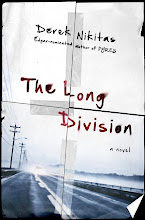Flipping TV channels. TV Land. Good Times. Family tries to get a loan for a startup business, turned down. I have two realizations: one, Tracy Morgan’s shtick on 30 Rock, though a good part of why I love the show, is exactly the same as J.J.’s was on Good Times. Two: sitcoms in the 70s were about real life, real problems, working class, kind of stuff I praised in yesterday’s post.
Exceptions, yes: Three’s Company, The Brady Bunch. But Taxi was about working Joes and Welcome Back Kotter was about an inner city school and a poor schlep who couldn’t make it out of the neighborhood. You got your aforementioned Good Times and All in the Family, and even Cheers was mostly working class (the pretentious characters were the ones most often ridiculed).
Making too much of nostalgia? Maybe. You’ve got King of Queens these days, Rosanne in the 80s. There’s always a market for the class struggle. But for the most part people want white collar offices and suburban families. It’s sitcoms—no real problems, just light laughs. I know.
But it’s not just sitcoms. Not a single soap opera, prime time or afternoon, is about poor people. It’s all lifestyles of the rich and dysfunctional. By contrast, lots of Mexican and European soap operas are about the working class, like the UK’s EastEnders. All American reality shows that are not contests are about rich people. Stupid rich people, but rich people. How is that reality? It’s just fantasy projection for the assholes who watch that stuff.
Why do we avoid the working class in our entertainment? Lots of answers. Marxists will say it’s the culture industry giving us our daily morphine doses, ensuring we don’t get pissed off. A simpler answer: escapism. After a long day’s work, who wants to come home to see somebody going through a long day’s work?
Okay. But ain’t it escapism to give the daily grind some levity via humor? That seemed to be the aim of shows like Good Times and Rosanne. Plus, the grittiest sitcoms tended to air—and thrive—in times of economic trouble, like the late 70s. Times when you’d think people’d want the most escape.
Sitcoms aren’t good examples, probably. Truth is: if a sitcom is funny, it’ll work. Strike that—if a good cross-section of dumbass America thinks a sitcom is funny, it’ll work. Full House and Home Improvement went on for years without a single good joke between them. Not one. Most 80s family sitcoms were vapid and mind-numbingly preachy like that. The Brady Bunch model.
Finally we’ve reached a cynical enough age where sharp-edged sitcoms have a chance in hell, though they’re still not gritty in a sociological sense. I laugh uproariously at least once during every episode of 30 Rock, and several times per Curb Your Enthusiasm—but, yes, both shows are about filthy rich members of the entertainment industry. But who knows—maybe twenty years from now an even more jaded populace will think those shows are too endearingly cheeky. God help us, if so. We’ll need comedy more than ever.
This started off being about class. Again, I’m no commie. I’m all for the free market. If dumbasses want Paris, give ‘em Paris. Hilton, that is. Plenty of channels to choose from. It’s just that those 70s working class sitcoms had an underlying desperation and sadness—a real subtext—that gave them layers beyond the comic surface. Archie Bunker was a complex character who evoked complex reactions in viewers. Not saying they were all complex, but the tones were there, the shades.
You say, who cares? Comedies ain’t supposed to be deep or gritty. I disagree. I mean, I agree most of the time, but I can imagine something even better. I’m not talking intellectual depth. I’m talking emotional layering. If we feel more deeply for characters, if we experience them in more complex terms, we are more emotionally invested in what happens to them. That way, our experiences of them, even the funny ones, are richer. Besides, good narrative art evokes a range of responses, not just laughter.
Maybe it’s all nostalgia. But think of the theme songs for those 70s shows: they were all downbeat, sad—either the lyrics or the music or both. The comedy wasn’t sharp-edged and cynical like today’s, but it came from a world people recognized and that they could attach their emotions to, not just laugh at.
I’m not saying the classic 70s sitcoms were better than our best contemporary sitcoms. I know that’s like saying British TV is better than American TV because of The Office and Monty Python episodes we see on BBC America and PBS. But I can say this: the economic upturn of the Reagan era turned the TV sitcom into a steaming pile of candy-coated crap, just like it was, generally, in the 50s and 60s.
These days we can say sitcoms are better, but they’re also much fewer. It’s reality TV that we’ll all have to look back on in shame (if we don’t already). Hey, maybe with our economy headed down the tubes once more, we can at least look forward to better-quality TV.
(That is, if the industry would hurry up and meet the WGAs reasonable demands. Any of you out there buying TV on DVD right now ought to be ashamed of yourselves. Seriously. That’s why I rent. Ahem—)
TV drama is a whole other mess for a whole other post, though I’ll get in line to praise HBO for their single-handed renaissance. Sure, the “edgy” turnaround that surfaced in the wake of reality show burnout has hailed a whole new world of vapidness (i.e., Nip/Tuck), but it has also brought us The Wire, the greatest show in the history of television.
This designation is the result of a recent poll I conducted with myself, but it also happens to be accurate. No coincidence that what makes The Wire great is its depth, its gritty realism, and its emphasis on class and race. Escapism it ain’t.



1 comment:
Nice post. I actually was thinking about similar issues regarding sitcoms and their construction of class struggle - and more specifically, urban spaces - over the last few decades. Good Times is a great case in point (sadly, the creator of that show, Eric Monte, is in an homeless shelter in Los Angeles now). Anyway, the first installment is here, if you'd like to read (http://tubatv.wordpress.com/2009/04/16/city-as-might-have-been-sitcoms-and-the-70s/).
Post a Comment